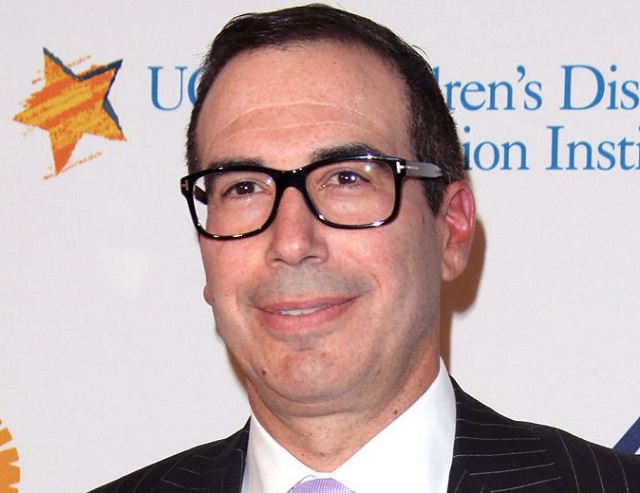
New York, United States | AFP |
Steven Mnuchin is hardly a household name, but US President-elect Donald Trump’s new pick for Treasury secretary has close ties to Wall Street that could prove a double-edged sword in the current populist era.
A former Democratic Party donor, the 53-year-old surprised his Wall Street and Hollywood associates in April when he became financial director of Trump’s White House campaign, all the more so because the Republican billionaire once sued a Mnuchin company over the financing of a Trump building in Chicago.
Trump’s incendiary campaign rhetoric against immigrants and free trade unsettled some in financial circles, who wondered if Mnuchin was committing professional suicide by associating himself with such a controversial figure.
But the business press speculated that the twice-divorced father of three viewed heading up the US Treasury as the cherry on top of a career that has taken him through all the highest spheres of American power: Wall Street, Hollywood and now Washington.
With his appointment, made official on Wednesday, Mnuchin is now being rewarded for taking Trump’s side at a time when the Republican Party’s major political donors, such as the billionaire Koch brothers, had avoided him.
He also will oversee regulation of the financial industry he was once a part of and has close ties to.
‘Huge economic growth’
Mnuchin has an unusual resume: he studied at Yale University and was a partner in Goldman Sachs, before he launched an investment fund backed by Democratic Party supporter George Soros and financed Hollywood blockbusters like “Avatar” and “Suicide Squad.”
Now the Wall Street veteran has to help deliver on the campaign pledges that took Trump to the White House amid modest growth and economic anxiety.
Trump has vowed to cut corporate taxes, as a bid to encourage multinational companies to repatriate their earnings, and to scrap the 2010 Dodd-Frank reform legislation, which was enacted to protect consumers and the financial system from Wall Street excesses that helped cause the 2008 crisis.
“By cutting corporate taxes, we’ll create huge economic growth and we’ll have huge personal income,” Mnuchin told CNBC early Wednesday just after his appointment was announced.
He said the goal is to cut the corporate tax rate in half to 15 percent, which will create jobs and boost growth.
“This will be the largest tax change since Reagan,” he said, referring to Republican President Ronald Reagan.
He added that he was confident the new administration would be able to expand economic growth from the current pace of 3.2 percent.
“Our most important priority is sustained economic growth, and I think we can absolutely get to sustained three to four percent GDP, and that is absolutely critical for the country,” Mnuchin said.
In addition, he said he wants to simplify taxes for the average citizen.
“Taxes are way too complicated, and people spend way too much time worrying about ways to get them lower,” he said.
International markets will be closely watching Mnuchin as well, given Trump’s protectionist talk during the campaign, including a threat to slap high import tariffs on Chinese products and label Beijing a currency manipulator, an issue the Treasury monitors.
Mnuchin told CNBC “we believe in fair trade and we believe that’s going to be a big boost to the economy.”
Banker, Hollywood investor
Mnuchin is the third Goldman Sachs investment banker to lead the Treasury since 1995. And though he left the company in 2002, he was present during the rise of the complex financial derivatives at the heart of the 2008 financial crisis and once described their creation as an “extremely positive development.”
Mnuchin in 2004 created the investment firm Dune Capital, which focuses on the entertainment industry.
But in the wake of the financial crisis, he returned to banking. He persuaded the billionaires Soros and John Paulson to bid on the assets of the failed California bank IndyMac, which collapsed with a portfolio of high-risk and so-called sub-prime loans.
To sweeten the deal, the US Federal Deposit Insurance Corporation agreed to absorb almost all the losses on part of IndyMac’s portfolio, according to Bloomberg.
Reborn as OneWest, the bank generated earnings partially through widespread home foreclosures, which prompted the websites Zero Hedge and IAmFacingForeclosure.com to accuse the bank of profiting by driving homeowners into foreclosure in order to collect loss-sharing payments from the FDIC. Mnuchin has denied those charges.
Mnuchin and fellow investors sold OneWest in 2014 for $3.4 billion to CIT Group, where he joined the board.
But California fair-housing groups recently lodged federal complaints, accusing the former OneWest founder of having discriminated against minority borrowers.
CIT told CNN the company was “committed to fair lending.”
 The Independent Uganda: You get the Truth we Pay the Price
The Independent Uganda: You get the Truth we Pay the Price





